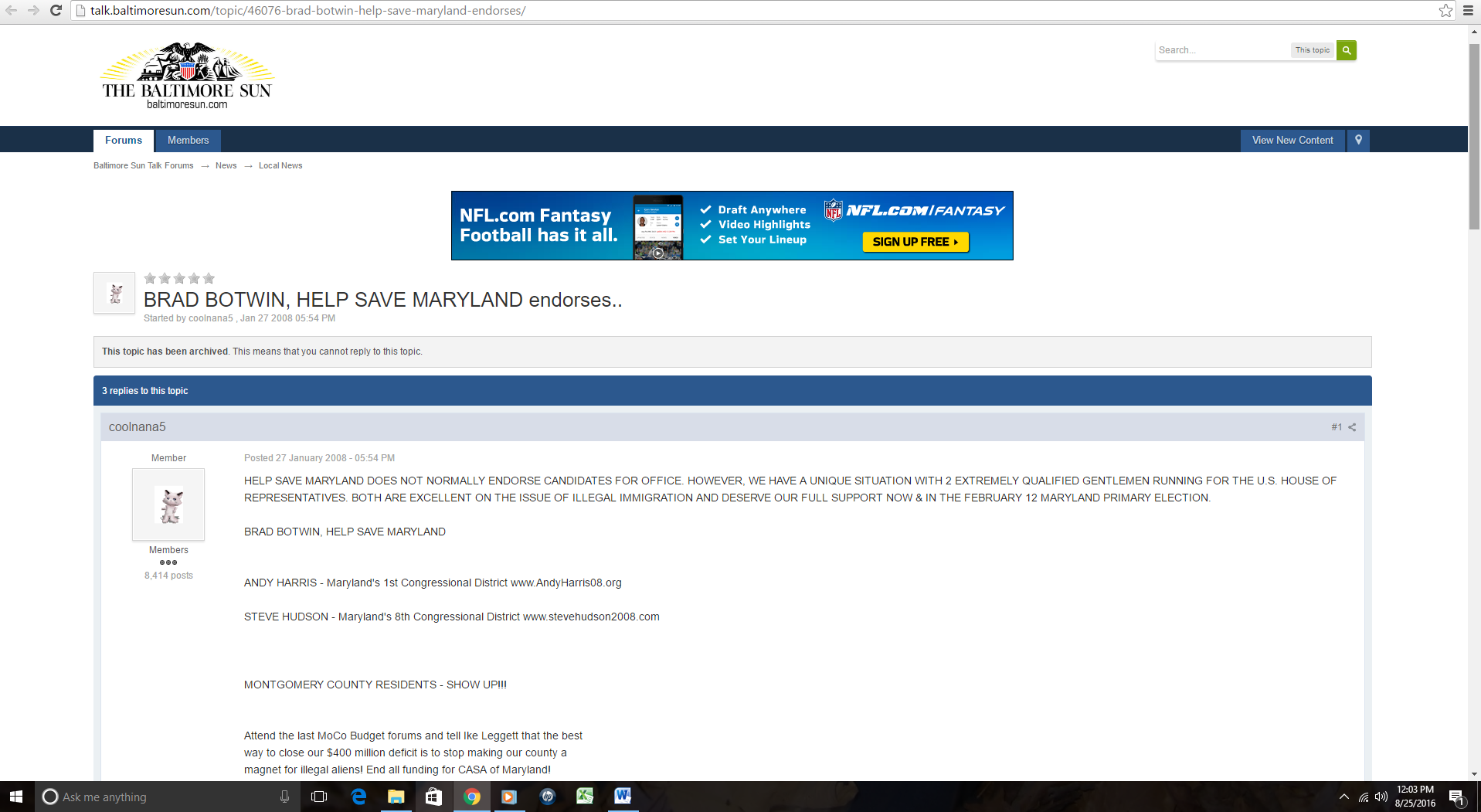By Adam Pagnucco.
Legendary Maryland politics writer Josh Kurtz is raising money for a new independent media venture. He has partners and he has an angel investor, so this could be for real, folks!
Kurtz, whose statehouse and local political reporting led to the Gazette’s Politics and Business edition twenty years ago, is regarded by many as Maryland’s best political columnist. Over the last few years, his columns have been published weekly by Center Maryland. But Kurtz is not content with his current gig. Like many in the state, he has identified a void in state and local news coverage as we described in our Politics After the Gazette series. And now Kurtz and a team of supporters are actually doing something about that: they are starting a new independent news site called Maryland Matters.
The concept of Maryland Matters is to have a lean, online news operation that would provide objective reporting and, eventually, commentary. Kurtz would like to have five full-time reporters, a couple of editors and a few business and technology people when the site is fully built out. Revenue would come from contributions that would be matched by a family foundation (more below). Other journalists who are connected to the project include former Post reporter Miranda Spivack, Bethesda Magazine reporter Lou Peck, former editor of Charles County’s Maryland Independent Angela Breck and University of Maryland journalism professor Adrianne Flynn. One or more of these folks might eventually provide content to the site. Kurtz has a steering committee featuring MANY prominent names from Maryland political circles.
Kurtz is holding a fundraiser in Annapolis on October 24 featuring the Post’s superstar national political analyst Chris Cillizza. If you follow Maryland news and politics, you should consider supporting this venture. Josh Kurtz’s credentials are beyond question and if this new site succeeds, it could be a turning point for state news coverage.
Following is the blast email promoting the fundraiser.
*****

Dear [ ]:
Want to hear from one of the nation’s premier political prognosticators just two weeks before Election Day — and support a great cause at the same time?
Then you’ll want to join us at a fundraiser in Annapolis on Monday, October 24 for Maryland Matters, an independent news website intended to be a one-stop shop for government and political coverage in Annapolis and in local jurisdictions around the Free State. Chris Cillizza, author of “The Fix” column at The Washington Post, will be our special guest.
For the past year, several journalists, as well as concerned citizens from business, communications, law and the public sector, have been working to launch Maryland Matters. It’s modeled on other excellent nonprofit online publications — from California and Texas to Connecticut and Vermont — created to ensure the survival of the type of “accountability journalism” that, for more than a century, was largely the province of the nation’s newspapers.
I don’t have to tell you that the resources devoted to state and local coverage by such institutions as the Post and The Baltimore Sun have shrunk dramatically in recent years. Other publications that once did an excellent job covering the State House, like The Gazette and The Examiner, are gone completely.
We aspire to fill this void by establishing the largest news bureau in Annapolis during the three months of the year when the General Assembly is in session, as well as providing year-round coverage of the executive branch and state regulatory agencies, major local jurisdictions, and the Maryland congressional delegation in Washington. Our plan is to launch Maryland Matters in 2017.
We’re happy to say that our idea has met with overwhelmingly positive reviews. The Community Foundation for the National Capital Region has created a fund for Maryland Matters, which enables us to solicit and collect tax-deductible contributions. Needless to say, it will cost a significant amount of money to pull this off.
But as we say in the news business, I’m burying the lede here: Just a couple of weeks ago, we got a financial angel — a family foundation has informed us that if we can raise $250,000, they will match it. This is exciting news and puts a lot of wind at our backs. Every contribution we receive is now essentially doubled.
So we are inviting you to our first Annapolis fundraiser, to be held from 5-7 p.m. onMonday, October 24, in the upstairs room at Stan & Joe’s, at 37 West Street. We’re honored to have Chris Cillizza joining us. We can’t think of a better person to talk about this crazy election year — and we hope you’ll take advantage of the opportunity to chat with him.
The suggested contribution is $250. We welcome donations both larger and smaller. Checks may be made out to: Maryland Matters Fund/Community Foundation. They can be brought to the event at Stan & Joe’s or mailed to the community foundation at 1201 15th St. NW, Suite 420, Washington, DC 20005.
We hope to see you on the 24th, so you can be more fully informed about our plans and spread the word to others. If you are not able to make it, I hope you can send along a contribution anyway — and tell your friends and colleagues about what we’re trying to do.
As a journalist, I’m not used to asking others for contributions. But all of us involved in this venture believe that nothing less than an informed public — elected officials, political activists, and voters at large — is at stake. So please be as generous as you can.
All the best,
Josh Kurtz
Maryland Matters Steering Committee Includes:
Hon. Michael Barnes
Angela Breck
Hon. Bill Bronrott
Bonnie Casper
Thomas Dennison
Adrianne Flynn
Andrew Friedson
Keith Haller
Ed Holzinger
Curtis Johnson
Hamza Khan
Joel Kirkland
Josh Kurtz
Hon. Terry Lierman
Len Lucchi
Hon. Connie Morella
Tyler Patton
Lou Peck
Hon. Steve Silverman
Hon. Jeffrey Slavin
Miranda Spivack
Hon. Chris Trumbauer





